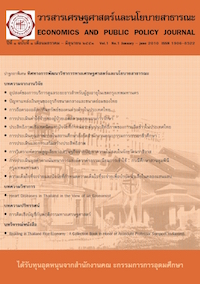การถือครองอสังหาริมทรัพย์ของคนต่างด้าวในประเทศไทย
Main Article Content
บทคัดย่อ
Ownership of Immovable Properties by Foreigners in Thailand
The objective of this study is to compile data on ownership of immovable properties by foreigners in the study areas, to explore the types of ownership and the processes through which the properties have been acquired. The purpose of this study was also to assess the nature of the problems of foreigners owning immobile properties in Thailand and the impacts. This study involved the collection of both secondary data from various public agencies as well as collection of primary data in three provinces, namely Rayong, Chiang Mai and Phuket.
Major findings were that there were both legal ownership of immovable properties by foreigners and cases where immovable properties were legally owned by Thais but in fact were de facto owned and utilized by foreigners. In the former case, mainly found in Rayong, legal ownership were granted according to the authority granted by various pieces of legislation mainly under the principle of promoting foreign investment. Cases where Thais were in fact acting as 'nominees' of foreign investors can be found in all provinces. These were however, mainly concentrated in Phuket due to the scenic beaches which were locations where there were high demands by foreigners. In such cases foreigners took advantage of the loopholes of the law to acquire land by using Thais as nominees. These nominees could either be their spouse, or employees of corporate bodies or legal entities. There were also cases where nominees were actually employees of law firms which assisted foreigners to register as a Thai corporate body.
The impact of foreigners owning immobile properties in Thailand can be both positive and negative. On the positive side, the local economies actually benefited foreigners owning immobile properties as this led to increasing level of land utilization. The negative impacts on the other hand were mainly the loss of revenue of local governments from local taxes and duties. One other negative dimension was also the difficulties of the public sector to control the negative environmental impacts.
Article Details
สงวนลิขสิทธิ์ © 2553 คณะเศรษฐศาสตร์ มหาวิทยาลัยศรีนครินทรวิโรฒ
คณะเศรษฐศาสตร์ มหาวิทยาลัยศรีนครินทรวิโรฒ จัดพิมพ์วารสารเศรษฐศาสตร์และนโยบายสาธารณะ เพื่อเผยแพร่บทความวิชาการทางเศรษฐศาสตร์ นโยบายสารธารณะ และสาขาอื่นๆที่เกี่ยวข้อง ทัศนะและข้อคิดเห็นใดๆ ที่ปรากฏในวารสารเป็นความคิดเห็นส่วนตัวของผู้เขียน โดยบทความที่ได้รับการตอบรับจะถือเป็นลิขสิทธิ์ของคณะเศรษฐศาสตร์ มหาวิทยาลัยศรีนครินทรวิโรฒ
บรรณาธิการ อาจารย์ ดร.พลพัธน์ โคตรจรัส


